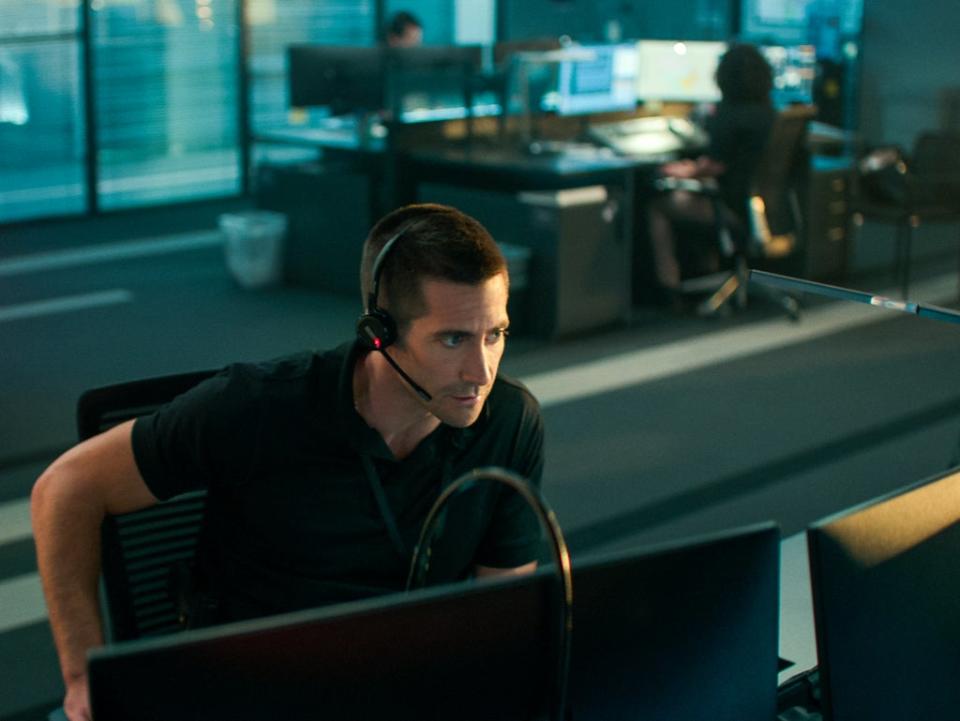The Guilty review: Jake Gyllenhaal dives into madness in this sensationalised remake

Dir: Antoine Fuqua. Starring: Jake Gyllenhaal, Ethan Hawke, Riley Keough, Christina Vidal Mitchell, Eli Goree. 15, 90 mins.
The Guilty reveals much about the American mindset. It’s entirely by accident. As a remake of an already excellent Danish film from 2018, titled Den Skyldige, it’s faithful to the point of perfect imitation – replicating not only plot lines, but small stretches of dialogue. Both feature a police officer who, awaiting the verdict on a potential incident of grave misconduct (we don’t hear about the details until much later), has been placed on the emergency calls desk. During one shift, on the night before his hearing, he picks up the phone only to hear the small, trembling voice of a woman who talks as if she’s speaking to a child. Our hero is moments away from dismissing the whole thing as a prank when it finally clicks. She’s been abducted. The man who took her is sitting right next to her, in a moving vehicle headed to who knows where.
In Den Skyldige, the officer is played by Jakob Cedergren, who keeps tight control over his performance, like he’s tuning a violin. In The Guilty, it’s A-lister Jake Gyllenhaal diving into full-blooded madness, all bug eyes and wildly gesticulating limbs in the role of Joe Baylor. Indeed, what separates this film from its predecessor is exactly what you’d expect of Hollywood – it’s more sensational and, in parts, more emotionally crass. But it’s also supremely efficient, having been placed in the hands of an action veteran like Antoine Fuqua. It thrills, even if it takes the easy route to get there. Unlike the measured mundanity of Den Skyldige, Fuqua plunges his Los Angeles-based film right into the middle of an apocalypse. We open on the wildfires. Flames lick up the sides of the screen as a chorus of voices, all dialling into 911, scream about stolen trucks, madmen with guns, and endangered children.
Most of the chaos, however, plays out in the background of The Guilty, confined to the little bits of news footage spotted on the TVs around the dispatch office. This is a single-location film, and it’s cinematographer Maz Makhani’s leering, nervous close-ups that fuel much of the immediate tension. The blaze stays where it is, never becoming an immediate threat – it’s the slowly tightening vice that stops short of crushing our hero. Compared to the usual freneticism of Fuqua’s filmmaking, as seen in Training Day or The Equalizer, his relative restraint here suggests his own interest in preserving the claustrophobic intimacy of the original. The stylistic flourishes come on a smaller scale, like the way the fizz of a tablet dissolving in water is amped up to sound like a lone, garbled scream.

Most of the film’s unnecessary excesses come from the changes in Nic Pizzolatto’s script. While little effort has been made to readjust the story so that it makes sense taking place in a city as vast as Los Angeles (Joe receives only a handful of other calls over the course of the film), the film does soften a few of its protagonist’s edges. We’re invited into Joe’s own marital troubles. His heroism is pure, uncomplicated by the self-centredness that drives the officer in Den Skyldige. And while Pizzolatto clearly expects his audience to see Joe’s upcoming hearing within the wider context of American police brutality, he has nothing worthy to actually say about it. In fact, the only thing that adds that necessary wrinkle to Joe’s unblemished characterisation is the extent of Gyllenhaal’s onscreen rage.
The actor’s always been very good at playing sweaty powder kegs, and he’s surrounded here by a supporting cast of on-phone voices (Riley Keough, Paul Dano and Ethan Hawke among them) that appropriately whither in reaction to Joe’s increasing frustration. It was Gyllenhaal, here in a producer role, who initially bought the rights to Gustav Möller’s Danish film. You could call this a vanity project, but at least his presence adds a dose of originality to this carbon copy remake.
Read More
James Bond: Daniel Craig’s last hurrah is disappointing and strangely anti-climactic
With Bingo Hell, Blumhouse finds another talented director to nuture – review
Netflix’s The Starling is an utterly bizarre, tonal misfire – review


